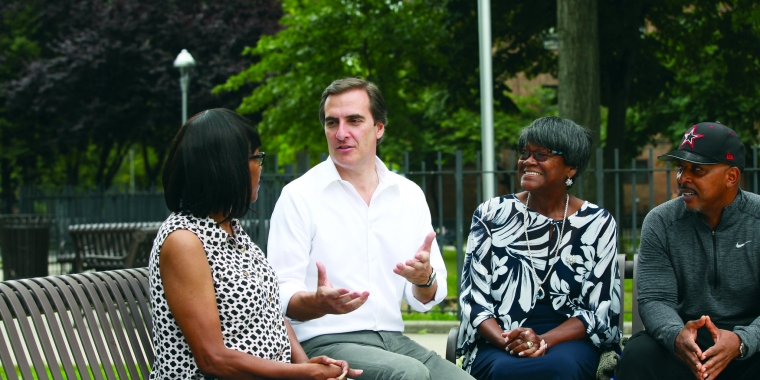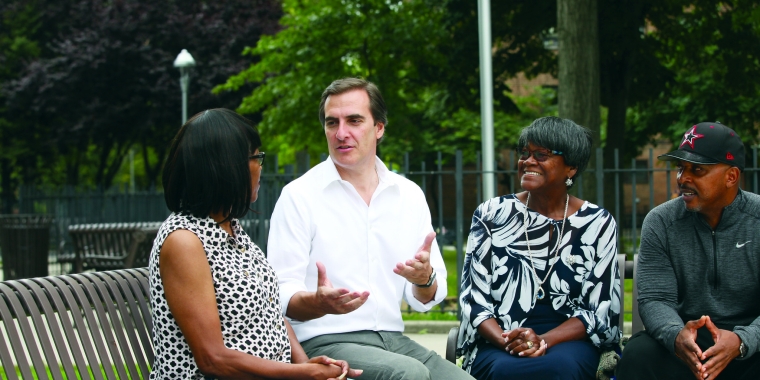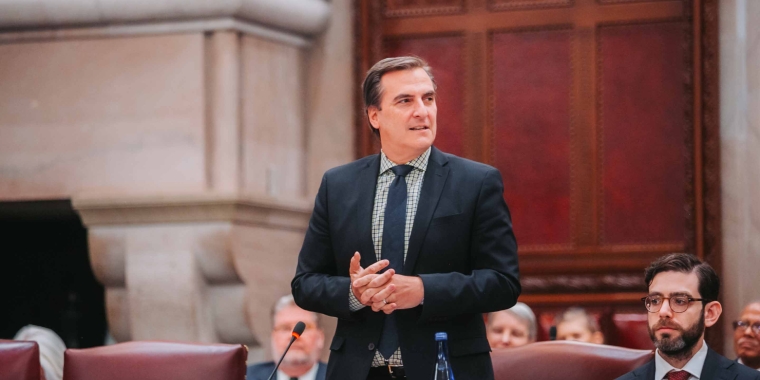
City & State: Dueling proposals to convert commercial properties into housing

The coronavirus pandemic and its economic impact has exacerbated New York City’s record levels of homelessness in New York City, and an affordability crisis, at a time when staying home was a matter of public health. State political leaders are proposing to respond by creating more housing, specifically by converting distressed commercial properties, and it’s one of the last sticking points in the state budget, which is now nearly two days late. But housing advocates warn the final budget will fall short on their demands for what they consider truly affordable and supportive housing.
Gov. Andrew Cuomo first raised the prospect of converting vacant commercial spaces into affordable housing during his State of the State address in January. “The housing problem in our cities has gotten worse, but the crisis of growing vacancies in our commercial property provides an opportunity,” Cuomo said in January. “Take the negative and make it a positive.” Cuomo’s initial proposal came not long after the Real Estate Board of New York identified hundreds of millions of square feet of commercial property that could get converted into living spaces.
Although Cuomo originally offered few details, he followed up his State of the State with language in his executive budget. Under his plan, which underwent some tweaks in his 30-day amendments in February, converting hotels in New York City with fewer than 150 rooms and certain types of office buildings in parts of Manhattan into housing would be easier by bypassing local zoning restrictions. Real estate developers would have three years to make use of the eased zoning rules, under the stipulation that 25% of the housing they build is affordable.
Cuomo’s proposal was met with skepticism among housing advocates, who felt it incentivized the creation of market-rate and luxury housing over affordable housing. “The governor’s proposal is essentially a real estate subsidy,” said Paulette Soltani, political director of the housing advocacy group VOCAL-NY. Although the proposal does not contain new subsidies, real estate developers are eligible for other subsidies when they create affordable housing, and Cuomo’s plan would make it easier to convert commercial buildings.
Soltani said Cuomo’s plan lacked specifics on income levels for affordability, which is why she and other activists worked on a competing plan. State Senate Deputy Majority Leader Michael Gianaris, a Democrat from Queens, introduced a bill called the Housing Our Neighbors with Dignity Act, or HONDA, in early March that offered a legislative counter to the governor’s proposal. Under the bill – which was included in the state Senate one-house budget resolution, with $250 million in funding – the state would purchase distressed hotels and other commercial properties in New York City for nonprofits to convert into permanently affordable housing. Although the Assembly did not include the proposal in its one-house budget, a standalone version of the bill has been introduced in the chamber and Speaker Carl Heastie recently expressed support on Twitter for the prospect of converting underused properties into housing.
Under Gianaris’ proposal, the converted residential buildings would need to be 100% affordable at 50% of the area median income or below. Of the new, rent-stabilized apartments created, 50% would be set aside for people experiencing homelessness. “The governor is simply saying ‘Let's take these distressed properties and turn them into housing,’ which will likely be acquired by the biggest, baddest developers in town to build more luxury housing,” Gianaris told City & State Wednesday evening.
Cuomo’s proposal is supported by the Real Estate Board of New York, a trade and lobbying group for the real estate industry that has traditionally been at odds with tenant and housing advocates. They consider Gianaris’ proposal too restrictive. “The proposed legislation seeking to exclude the private sector from any conversions program will not be economically feasible and will prevent the State and City from working together to generate much-needed housing and affordable housing,” REBNY President James Whelan said in an emailed statement Friday.
Figuring out what a conversion plan will look like has been one of the “handful of outstanding issues” in the budget, Gianaris said Wednesday evening, which was technically before the April 1 budget deadline. Not much had moved by Friday afternoon, when only one out of 10 budget bills had passed and only three had been introduced.
Both Cuomo and the state Senate had included their hotels and commercial properties conversion plan in the transportation, economic development and environmental conservation budget bill, more commonly known as the TED bill. As of Friday afternoon, the TED bill was the only non-appropriation budget bill to get introduced. But the stripped-down legislation was missing many contentious issues, including hotel conversions, an indication that lawmakers and the governor were still attempting to come to an agreement.
Gianaris said that while he would like to see his full program as part of the budget, with all $250 million the state Senate included for funding, he acknowledged that it may not come to pass. The most important thing is to make sure the state has the means to publicly acquire distressed properties. “We need to, at a minimum, appropriate-enough funding to make that happen even if we put the meat on the bones later,” Gianaris said.
A few days later, it seemed like Gianaris’ back-up plan might come to pass, according to Soltani, who said that the language actually creating Gianaris’ program had been removed from the budget. She said funding was reduced to $100 million, with the stipulation that the state would not use that money until a program for buying and converting distressed commercial properties was established. “This causes more delays for homeless New Yorkers, when we could have just had HONDA,” Soltani said. A spokesperson for Gianaris did not respond to a question about whether Soltani was right about what is currently in the budget bill. And a spokesperson for the state Division of the Budget did not respond to a request for comment on the status of negotiations on the dueling proposals.
Only one thing about housing conversion policy is certain: nothing is final until the actual text gets released.



